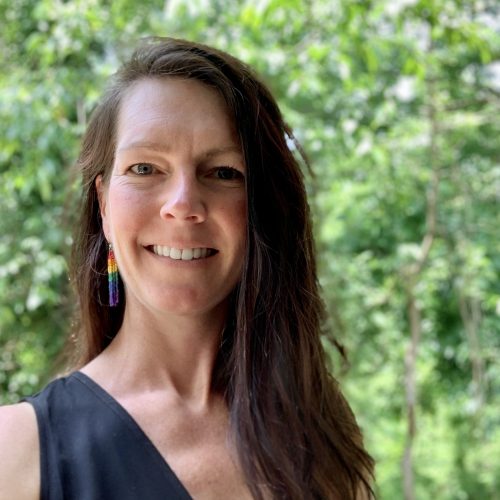
Amanda Wray, Ph.D.
Director of Women, Gender, and Sexuality Studies; Associate Professor of Interdisciplinary StudiesContact Information
- awray1@unca.edu
- 456-7890
- 214 Zeis Hall
Office Hours
- Monday 10:30 am - 11:00 am
- Wednesday 10:30 am - 11:30 am
- Note: Thursday and Friday office hours are online by appointment.
In 2011, I joined the English Department at UNC Asheville, and I remain so inspired by our students and invested in the liberal arts model of education on this campus. In the courses I teach, I value community engagement, which means that students often use their writing for course projects to serve a public purpose. For example, producing grants for a local non-profit, translating research projects into letters to the editor, or crafting online multimodal texts for visitors in the Burton Street Peace Garden. Writing is an important tool for critical thinking and creativity, but also, the ability to write effectively for different situations remains a most valuable and marketable skill within and beyond the university. As a first-generation college student from rural Kentucky, I feel most grateful for my writing teachers who equipped me with tools for professional communication and who impressed upon me the necessity of process.
My scholarship dances around many areas including oral history, feminism, rhetorics of inclusion and equity, visual rhetoric, professional writing, research methods, gender and sexuality studies, and creative nonfiction. Currently, I am writing an article coding the ways in which “diversity,” the term, is used in over 2,000 higher education job advertisements within English studies. In spring 2019, with the help of four English Department interns, I partnered with Blue Ridge Pride to collect oral histories and research artifacts for a needs assessment of the LGBTQ+ communities of Western North Carolina.
Education
- B.A. in English, University of Kentucky, 2002 (minor in Business)
- M.A. in English Literature, University of Kentucky, 2004 (Graduate Certificate in Women and Gender Studies) Thesis: Marked Body: A Woman’s Work
- Study Abroad at W.B. Yeats International Summer School in Sligo, Ireland (2002)
- Ph.D. in Rhetoric, Composition, and the Teaching of English, University of Arizona, 2011 Dissertation: Lived Histories and the Changing Rhetoric of White Identity
Courses Taught
- Foundations of Academic Writing (LANG 120, service learning designated)
- Creative Nonfiction Writing Workshop (LANG 366, service learning designated)
- Introduction to Women, Gender, Sexuality Studies (WGSS 100)
- Life Writing and Female Social Activists (LIT 346)
- Professional Writing (LANG 354)
- Research Methods and Senior Capstone Seminar (WGSS 400)
- Rhetorics of Social Justice (LIT 178)
- The Teaching of Writing (LANG 396)
- Visual Rhetoric (LANG / HON 373)
- Writing in the Workplace - Writing for Professionals (designed for Asheville Fire Department via Leadership Asheville)
Current Affiliations
- American Association of University Women
- Carolina’s Writing Program Administrators
- Conference on College Composition and Communication
- Council of Writing Program Administrators
- Feminist Action Research in Rhetoric
- National Women’s Studies Association
- National Council of Teachers of English
- Rhetorical Society of America
- SafeZone Training, University of North Carolina Asheville
Recent Publications
Books Contributions
- Wray, Amanda. (2017). Chapter 7: STEM Histories: Complicating Dominant (Object-Oriented) Narratives. In K. Llewellyn & N. Ng-A-Fook (Eds.), Oral History and Education (pp. 129-46). New York, NY: Palgrave Macmillan Press.
- Verzosa Hurley, Elise., Wray, Amanda. & Cirillo-McCarthy, Erica. (2017). Chapter 27: Rhetorics of Interruption: Navigating Sexism in the Academy. In K. Cole & H. Hassel (Eds.), Surviving Sexism in Academia: Strategies for Feminist Leadership (pp. 259-269). Abingdon, UK: Routledge Press.
- Wray, Amanda. (2013). What to Think About When Writing for a Particular Audience. In J. Moxley and J. Yirinec (Eds.), Network, Collaborate, Compose: College Writing in the Digital Age. Tampa, FL: University of South Florida Press.
- Wray, Amanda B. (2009). Racial Slurs: Authority and Implications. In C. Minnix and C. Nowotny-Young (Eds.), Student Matters / Civic Matters: Writing Personal Interests into Public Lives (pp. 193-97). New York, NY: Hayden-McNeil Publishing.
- Wray, Amanda B. (2007). Gertrude Mossell. In Y. Page (Ed.), Encyclopedia of African-American Women Writers (pp. 434-35). Westport, CT: Greenwood Press.
- Wray, Amanda B. (2006). Adrienne Rich. In S. Kellman (Ed.), Magill’s Survey of American Literature (pp. 193-96), Revised Edition. Pasadena, CA: Salem Press, 2006.
- Wray, Amanda B. (2006). Ralph Ellison. In S. Kellman (Ed.), Magills Survey of American Literature, Revised Edition (724-27). Pasadena, CA: Salem Press.
- Journal Articles
- Wray, Amanda. (2018). Contesting Traditions: Oral History in Creative Writing Pedagogy. Assay: Journal of Nonfiction Studies 5(1).
- Wray, Amanda. (2018). The Stories We Tell: Critical Dialogue As Consciousness Raising Pedagogy. Journal on Excellence in College Teaching 29(1), 177-202.
- Wray, Amanda. (2017). Region, Race, and Ethos: One Teacher’s Story on Racism in Two Places. Pedagogy: Critical Approaches to Teaching Literature, Language, Composition, and Culture, 17(1), 59-76.
- Wray, Amanda. & Batada, Ameena. (2017). Contemplative Pedagogy: Equipping Students for Everyday Social Activism. The Arrow: Journal of Wakeful Society, Culture, & Politics, 4(2),
- 29-46.
- Wray, Amanda. (2016). Teaching Professional Writing and Anti-Oppression Rhetorics. Transatlantica section of Res Rhetorica: Polish Society of Rhetoric 2.
- Wray, Amanda & Verzosa Hurley, Elise. (2016). Feminist Rhetorical Praxis: Everyday Feminism as Public Agora. Res Rhetorica: Polish Society of Rhetoric 2.
- Wray, Amanda. & Bahls, Patrick. (2015). LaTeXnics: The Effect of Specialized Typesetting Software on STEM Students' Composition Processes. Computers and Composition: An International Journal, 37, 104-116.
- Wray, Amanda B. (2008). The Rhetoric of Racism: First-Year Composition Students on Affirmative Action. Watermark Journal 2, 184-201.
- Wray, A.B. (2008). The Rhetoric of Racism: First-Year Composition Students on Affirmative Action. Watermark Journal 2, 184-201.
Creative Works
- Wray, Amanda. (2015). The Family Diary. Remedy Quarterly: The Taste Issue 17, 58-64.
- Wray, Amanda. (2013). Black Dolls. The Things They Carry: American Athenaeum. Sword & Saga Press.
Journal Publications
- Wray, A. (2020). Holly Boswell: Asheville's Social Justice Warrior, Voices from the LGBTQIA Archive of Western North Carolina. Journal of Appalachian Studies, 26(2), 173-190. doi:10.5406/jappastud.26.2.
0173